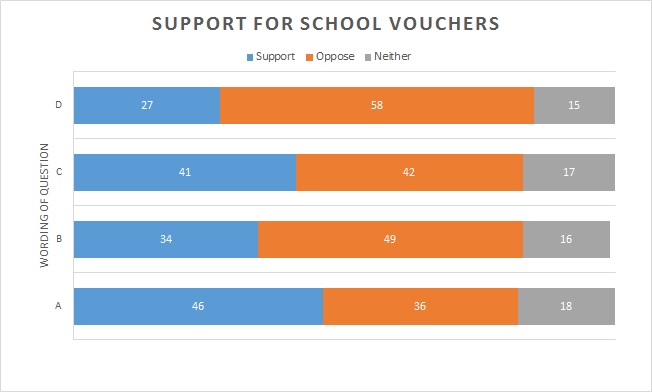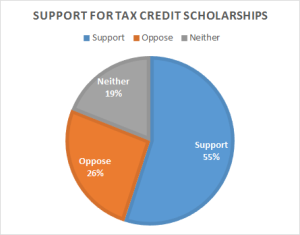There’s no question plenty of families want private school choice, as programs around the country keep growing and some are forced to turn families away.
But the general public’s views on school vouchers remain far more murky. The latest annual public-opinion survey on school reform, released this morning by Education Next, shows why the question can be tricky. It asked about vouchers four different ways, without ever using the word.
Questions that emphasized “wider choice” for students found broader support. Those that noted the use of “government funds” to pay private school tuition found stronger opposition. Opinions also varied if the questions asked about vouchers for “all families” or “low-income” students.
This helps explain why other surveys by Gallup and the Friedman Foundation for Educational Choice can find starkly different results.

On a conference call discussing the poll, Paul Peterson, the editor of Education Next and director of the Program on Education Policy and Governance at Harvard University, said among the wide range of policy topics covered in the survey, vouchers are among the most sensitive to the wording of the question.

Still, many of the results on private school choice mesh with other surveys. Blacks and Hispanics are considerably more likely to support vouchers. Whites are especially skeptical of programs for low-income students. And the public seems to favor of tax credit scholarships over vouchers.
Martin West, an associate professor of education at Harvard and editor of Education Next, noted a wide range of reforms, including private school choice but also charter schools and merit pay for teachers, saw small dips in support in this year’s survey. Not all the declines were statistically significant, but public opinion on the policies seemed to be slipping below the high-water marks set last year.
“It’s not as if we’re finding strong opposition to those policies,” he said. In general, “support continues to outweigh opposition by a considerable margin, but there has been some slippage over the past year.”
Here are the responses to different questions the survey posed on school vouchers.
a. A proposal has been made that would give all families with children in public schools a wider choice, by allowing them to enroll their children in private schools instead, with government helping to pay the tuition. Would you favor or oppose this proposal?
Completely Support 19
Somewhat support 27
Somewhat oppose 19
Completely oppose 17
Neither support nor oppose 18
b. A proposal has been made that would use government funds to pay the tuition of low–‐income students who choose to attend private schools. Would you favor or oppose this proposal?
Completely Support 12
Somewhat support 22
Somewhat oppose 22
Completely oppose 27
Neither support nor oppose 16
c. A proposal has been made that would give low‐income families with children in public schools a wider choice, by allowing them to enroll their children in private schools instead, with government helping to pay the tuition. Would you favor or oppose this proposal?
Completely Support 14
Somewhat support 27
Somewhat oppose 19
Completely oppose 23
Neither support nor oppose 17
d. A proposal has been made that would use government funds to pay the tuition of all students who choose to attend private schools. Would you favor or oppose this proposal?
Completely Support 11
Somewhat support 16
Somewhat oppose 20
Completely oppose 38
Neither support nor oppose 15
Correction: An earlier version of this post repeated question “d” where question “a” should have been. We regret the error.


